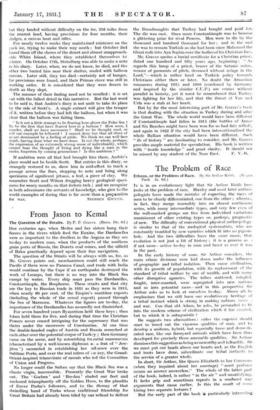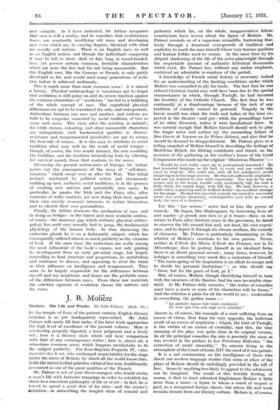The Problem of Race
Ethnos, or the Problem of Race. By Sir Arthur Keith. (Kogan Paul. 2s. 6d.) IT is in an evolutionary light that Sir Arthur Keith here looks at the problem of race. Huxley and most later antlim-
pologists have made the mistake of expecting the races of men to be clearly differentiated, one from the other ; whereas, in fact, they merge insensibly into an almost continuous series, with many intermediate types, and very few even of the well-marked groups are free from individual variations reminiscent of other existing types or, perhaps, prognostic of new. The difficulty of conventional physical anthropology is similar to that of the zoological systematists, who are constantly troubled by new varieties which fit into no pigeon- hole. And the two difficulties have the same cause, that evolution is not just a bit of history ; it is a process as - if not more—active to-day in man and beast as ever it was in the past.
In the early history of man, Sir Arthur considers, the main ethnic divisions were laid down under the influence
of geographic and tribal isolation. Then came civilization, with its growth of population, with its replacement of the standard of tribal welfare by one of wealth, and with ninny other disruptive agencies. The tribes scattered, mingled,
fought, inter-married, were segregated into new nations and so into potential races—and in this perspective Sir Arthur asks us to look at ourselves to-day. Above all, he emphasizes that we still have our evolutionary heritage of a tribal instinct which is strong in making nations, races - and war. Can that old Adam, he asks, be persuaded to fit into the modem scheme of civilization which it has created, but to which it is antagonistic ?
He suggests two alternatives : either the eugenist should start to breed out the vigorous qualities of man, and to develop a uniform, hybrid, but especially tame and domesti-
cated race, like our farmyard animals which have been thus developed for precisely those amenable qualities. Sir Arthur
dismisses this suggestion as being as unworthy as it is feasible. Or we must put our heads above our hearts and, as the English and Scots have done, subordinate our tribal instincts to the service of a greater whole.
In short, Sir Arthur, like Queen Elizabeth to her Commons (when they inquired about her marriage) "must perforce return an answer answerless." The whole of the latter part of the book, indeed, is rather "in the air" and unsatisfying. It lacks grip and sometimes repeats in a confused way arguments that came earlier. Is this the result of com- bining two separate lectures ? But the early part of the book if particularly interesting and valuable. As I have indicated, Sir Arthur recognizes that race is still a reality, and he considers that evolutionary forces are constantly modifying old races and developing new races which are, in varying degrees, identical with what we usually call nations. There is an English race, as well as an English nation, and though the individuals composing it may be tall or short, dark or fair, long or round-headed, they yet possess certain common, heritable characteristics which are none the less real for not being measurable. But this English race, like the German or French, is only partly developed so far, and would need many generations of isola- tion before it achieved uniformity.
This is much more than mere common sense : it is almost a heresy. Physical anthropology is sometimes apt to forget that evolution is still going on, and its severe reaction against the extreme absurdities of" nordicism " has led to a belittling of the whole concept of race. The superficial physical differences are apt to be considered the only, and unimportant, distinctions between one race and another, and nations are held to be congeries, cemented by social tradition, of two or more such races. This view, after the reaction, is natural ; for while stature, colouring, and other measurable characters are unimportant, such fundamental qualities as disease- resistance and temperamental proclivities are apt to escape the foot-rule of science. It is also easy to attribute to social tradition what may well be the result of racial temper— though, of course, the two would interact, the race moulding the tradition, and the tradition intensifying both by selecting for survival mainly those that conform to the mores.
Discussing the present nation-races of Europe, Sir Arthur points out 'the consequences of the wave of " self-deter- mination " which swept over us after the War. This tribal instinct, reinforced by political action and strenuously building up new, exclusive social traditions, is in the process of creating new nations and potentially new races. In particular, he quotes the Irish and the Finns who, after centuries of wider contacts, are now doing their best, against their own strictly economic interests, to isolate themselves and to cherish their own personalities.
Finally, Sir Arthur discusses the mechanism of race, and in doing so bridges—in the barest and most readable outline, of course—the immense gap which ordinary physical anthro- pology has until very recently had to jump, the fundamental physiology of the, human body. In thus discussing the endocrine glands he is on a fashionable subject, which has consequently suffered almost as much publicity as the vitamins of food. At the same time, the endocrines are really among the most influential of the body's organs, not only guiding its development from an early pre-natal stage, but largely controlling its final structure and proportions, its metabolism 'and resistance to disease, and appearing to rival the brain in their influence on intelligence and temperament. They seem to be largely responsible for the differences between myself and my neighbour, and hence are the probable cause of the differences between races. From these raw materials the selective agencies of evolution choose the nations and the races.





































 Previous page
Previous page